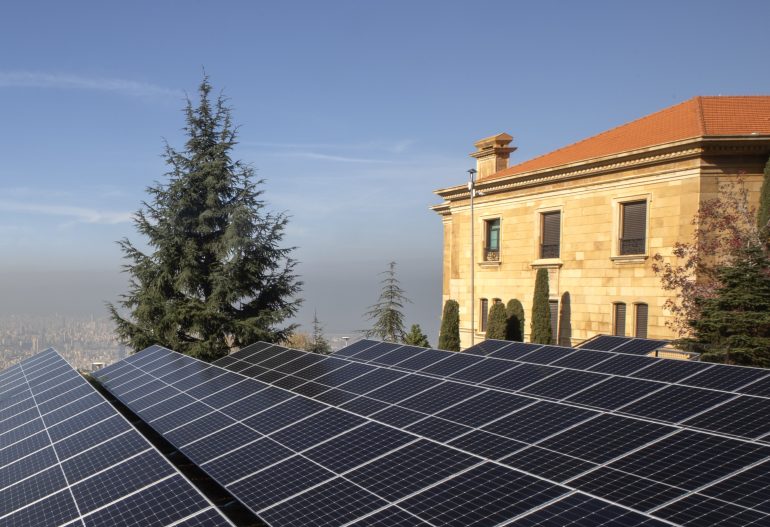Lebanon’s economic collapse means that the Lebanese people are now responsible
for sourcing their own electricity for most of the day, every day. Many of them are
now turning to solar power — previously seen as a luxury.
Lebanese citizens do, at least, have some experience with securing their own
power: For the past 40 years, the country’s patchy electricity supply has meant that
24-hour power was almost impossible to come by, so the majority of Lebanese are
familiar with having to use private generators to access electricity during the
country’s frequent power cuts, but even this solution faced many problems so they
went to find a new path, through the clean energy.
One of the most important facts, that the United Nations urged countries to reduce
their dependence on fossil energy sources, and focus their efforts on increasing
reliance on renewable energy.
The United Nations has ambitions to increase the world’s dependence on clean
energy from about 30 percent today to more than 60 percent in 2030 and 90
percent in 2050.
This strategy raises many questions, especially in the Lebanese case, that we need
to answer. Do we really have an opportunity to switch our energy to clean one?
Clean Energy
Lebanon had never paid sufficient attention switch regarding the clean energy, but
many factors played a role, especially in the last two years, where the Lebanese did
not find a source of energy other than the Renewable one, and Perhaps this
situation looks like a hope for Lebanon to cross over to investing in clean energy in
the medium and long term.
Many factors played a role to switch on the new path of energy:
1-The economic crises that erupted in 2019, and was classified by the World Bank
as one of the worst crises in the world affected all sectors, mainly the energy
sector.
Due to the loss of the national currency 95 percent of its value, and the decline in
liquidity in foreign currency, the Lebanese state was obligated to reduce its
dependence on expensive energy imports of fuel oil and diesel, in addition to the
deterioration of the electricity distribution network and its exposure to huge
technical and non-technical losses.
This situation obliged the two main power plants in Lebanon to shut down after
running out of fuel. The Erratic power supplies have put hospitals and essential
services in crisis mode.
2-The Lebanese increasingly depend on private operators that also struggle to
secure supplies amid an unprecedented crash of the national currency. The price of
diesel, which is used to run private generators in the absence of state electricity,
has increased since the government lifted subsidies and the Diesel became entirely
unsubsidized and must be paid for in cash dollars.
These factors prompted the Lebanese individuals and companies to search for new
sources of energy, and citizens tended to expand the use of solar energy, which
received great interest and is still in progress.
Turning Crisis Into Opportunity
It is no secret that the United Nations is paying attention to the clean energy sector
in Lebanon and its attempt to turn the crisis into an opportunity through solar
energy, in addition to the government’s timid attempts to target increasing the share
of renewable energy to 30 percent of the country’s energy consumption by 2030.
However, In fact, the economic crisis was and still is the main driver for the
growth of the renewable energy sector in Lebanon, not government policies,
although the renewable energy sector requires a unique attention by the official
authorities in terms of setting legal and regulatory frameworks and securing the
necessary official support at the level of planning and organization.
According to official numbers, Lebanon moved from a country that did not have
any solar energy projects in 2010, to a country that has nearly 1,000 projects in
2020, then thousands of projects in 2022, with a total capacity estimated at
hundreds of megawatts at the level of Lebanon.
Furthermore, between 2020 and 2023, the movement of solar energy companies
reveals tremendous activity in terms of expanding dependence on solar energy, and
this has been accompanied by strengthening the capabilities of technicians and
engineers and increasing the awareness of local communities about the importance
and quality of clean energy and its provision in terms of health and material costs.
In fact, we can say that Lebanon (Private sector, and Individuals) succeeded in
finding alternatives to the scarcity of energy based on diesel and fuel in the
country. Clean energy is now the most abundant. However, it remains difficult to
generalize the energy experience unless successive governments in Lebanon
generalize solar energy projects to generate electricity to meet the needs of all
citizens.





